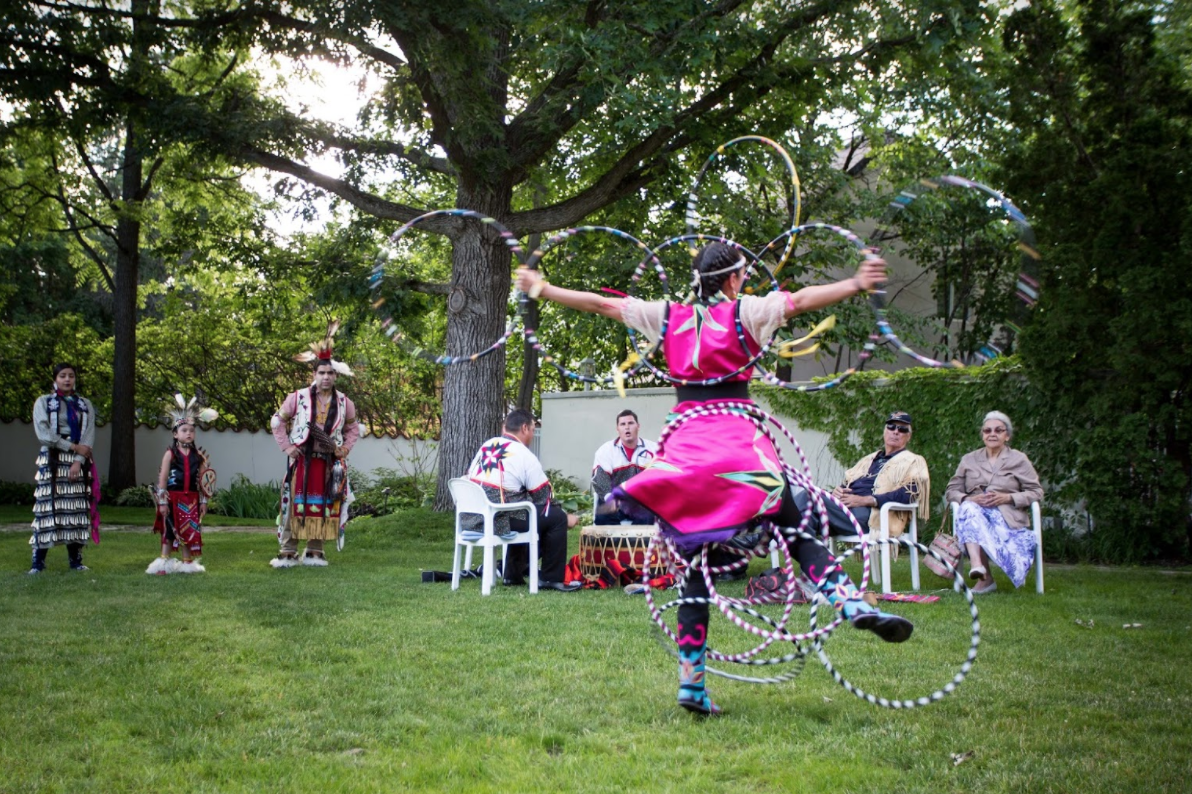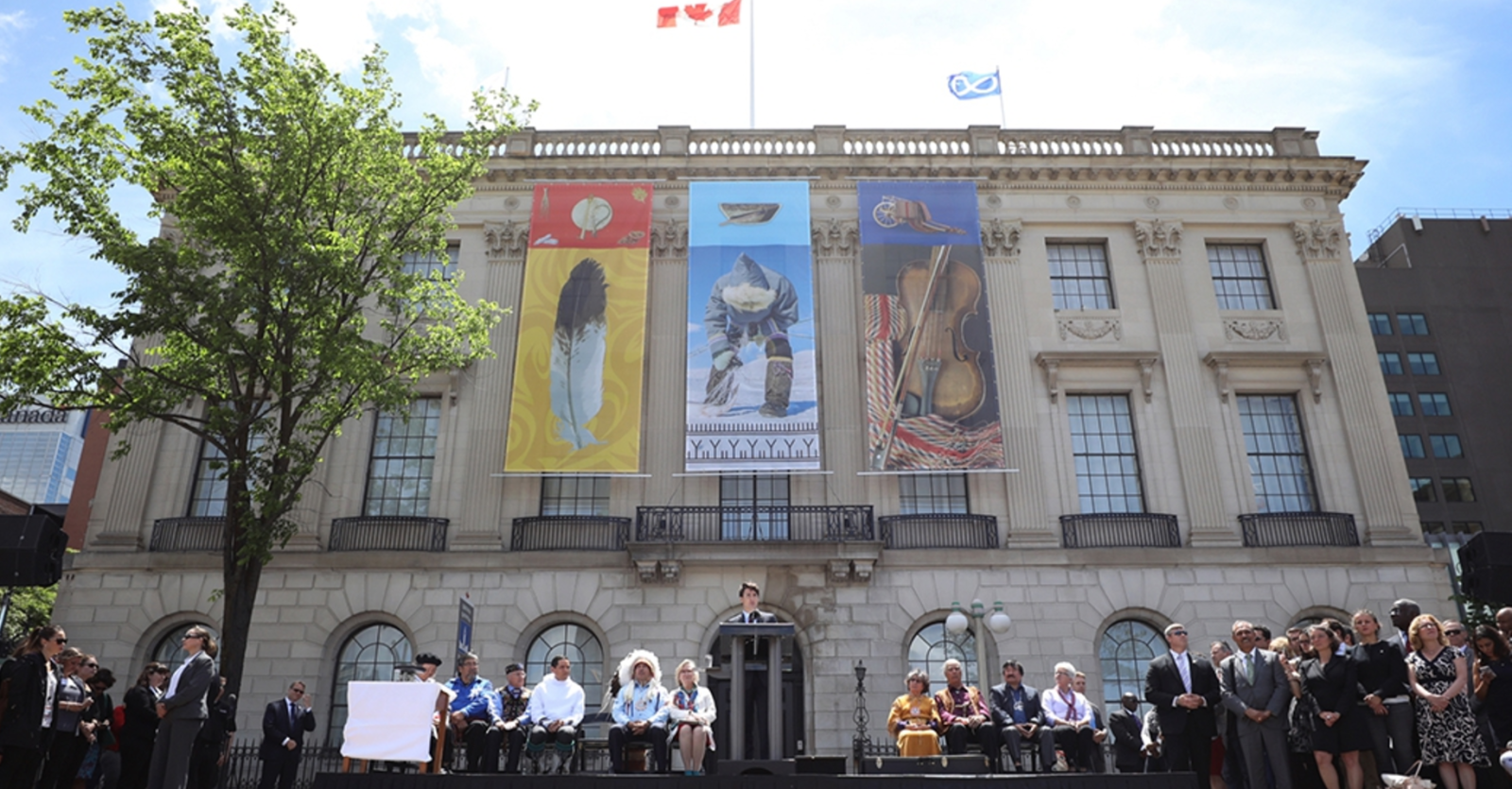'It's a sign'
Scroll down to continueDancers Odeshkun Thusky (left) and Awema Tendesi prepare to take the stage — or lawn, in this case — to perform for a crowd at the German ambassador's residence in Ottawa on Tues. June 20, 2017. Members of the Algonquin First Nations were honoured with a flag-raising ceremony on the eve of National Aboriginal Day. Photo by Alex Tétreault
As Verna Polson began her speech, a gust of wind blew the flag of the Algonquin Anishinabeg Nation Tribal Council into her face.
“It’s a sign,” she said, in an outburst of joy.
Polson, the council’s grand chief, was speaking at a flag-raising ceremony honouring Algonquin First Nations at the Ottawa residence of German Ambassador Werner Wnendt on Tuesday evening.
The flags of the council and the Algonquins of Pikwakanagan First Nation were hoisted into the wind on June 20, alongside those of Germany, Canada and the European Union in a ceremony meant to “honour the people that have owned the land where our residence is built upon for thousands of years," according to the German Embassy.
In a touching speech, Polson said it was a very historical moment.
“I thank the creator for this beautiful day,” she said, as guests including Ottawa Mayor Jim Watson looked on. “It's been way too long and I'm glad we have the opportunity to raise our flag...I’m truly grateful. I will never forget this.”
Chief Kirby Whiteduck of the Algonquins of Pikwakanagan called it a “momentous occasion” and discussed the symbolism of Pikwakanagan’s flag.
“It’s a good time with Canada's 150th to start reconciliation,” he said.
Flags raised, gifts offered
Scroll down to continueHoop dancer Sarah Decontie performs in front of traditional drummers at the German ambassador's residence in Ottawa on June 20, 2017. Photo by Alex Tétreault
Polson, Whiteduck and others presented gifts to Wnendt in appreciation for the flag-raising. Whiteduck’s gift was a book he authored, Algonquin Traditional Culture, which describes the Algonquins of the Kitchissippi Valley.
Claudette Commanda, a professor and Algonquin Anishnabe from the Kitigan Zibi Anishinabeg First Nation, gave the gift of eagle feathers to the ambassador.
“With all my heart and my spirit, it has been an honor to meet you,” she said.

Chief Adrienne Jérôme of the Lac Simon Anishinabe Nation also described the occasion as a great honour. Earlier in the evening, Wnendt met privately with the chiefs and Mrs. Wnendt-Juber.
Other guests spotted in the crowd include Dutch Ambassador Henk van der Zwan and Slovakian Ambassador Andrej Droba.
A smudging ceremony was performed by Pete Delconti and Josée Whiteduck. There was also traditional dancing, music and food, including performances by dancers Odeshkun Thusky, Awema Tendesi, and Sarah Decontie.
A new name
Scroll down to continueA masked dancer from the Nanwakolas Council dances in celebration of new agreements to protect British Columbia's stunning Great Bear Rainforest during a celebration in Vancouver, B.C. Photo by Elizabeth McSheffrey
The event was held the eve of National Aboriginal Day. Prime Minister Justin Trudeau announced the following morning that the federal government intends to rename the day as National Indigenous Peoples Day.
"No relationship is more important to Canada than the relationship with Indigenous Peoples," read Trudeau's statement marking the day.
"Our government is working together with Indigenous Peoples to build a nation-to-nation, Inuit-Crown, government-to-government relationship – one based on respect, partnership, and recognition of rights."
There have been calls, however, for the government to go further and make the day a statutory holiday. The decision to do so was recently made in the Yukon, where Premier Sandy Silver said, "It's about time."

Reconciliation promises
Scroll down to continueAutumn Peltier, 12, cries as she hands gifts to Prime Minister Justin Trudeau, with Elder Elmer Courchene and Assembly of First Nations National Chief Perry Bellegarde in Gatineau, Que. on Dec. 6, 2016. At the time, Trudeau told her: "I will protect the water." Photo by Alex Tétreault
Trudeau campaigned on a promise to "renew the relationship between Canada and Indigenous Peoples" and gave Indigenous Affairs Minister Carolyn Bennett an extensive mandate.
During their time in office, the Liberals have made some progress on these initiatives, including reducing the number of boil water advisories on reserves, and launching a national inquiry into missing and murdered Indigenous women and girls. That inquiry, however, has been criticized for lengthy delays and lack of communication with the families of victims. Dozens of boil water advisories also remain throughout the country.
Meanwhile, Trudeau has asked the pope to apologize for the Catholic Church's role in the residential schools tragedy, and this winter launched a review of laws and policies related to Indigenous people.

Trudeau also announced Wednesday that a long-vacant, but prime, real estate location in Ottawa across from Parliament Hill, 100 Wellington St., would become "a new space for Indigenous Peoples."
And he announced that Langevin Block, across the street from 100 Wellington, and the home of his office, would be officially renamed the Office of the Prime Minister and Privy Council. The building was originally named after Hector-Louis Langevin, who is considered one of the Fathers of Confederation, but a controversial historical figure for his role in helping establish the residential school system.
